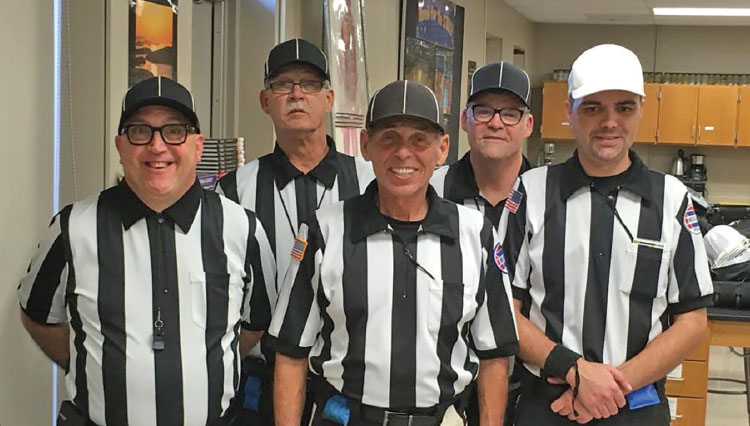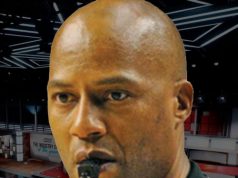In 2005, Dick Kitchens, from the Gold Leaf Football Officials Association in Tifton, Ga., gave then-17-year-old Jeremiah Thalheimer of Tifton a shot at working middle school football. Little did Thalheimer know his football career would suddenly shift gears after 15 years and his first year as a varsity white hat.
Brad Moran, director of the NASCAR Touring Series at the time, told Thalheimer in 2016 that he came across his résumé and wanted to bring him into the NASCAR K&N Pro Series West (now the ARCA West series), or what Thalheimer compares to Class A baseball. On
Thalheimer’s résumé, his officiating included work at several short tracks, including those in Irwindale, Calif., and Kansas City, Kan. He would eventually be offered a full-time role with NASCAR — working the three major series, including the NASCAR Cup Series. Thalheimer, 32, made the decision to make a dramatic left turn — handing in his white hat for a protective helmet and a full-time job with NASCAR. Though he had to sacrifice working varsity football, he still works sub-varsity games during the week in Overland Park, Kan., where he lives on his off days.
The decision to move full speed ahead came in June 2019 when Thalheimer was offered the chance to work his first Cup Series (major league tier) race at Pocono Raceway in Long Pond, Pa.
“That was the equivalent of a high school official getting called and saying, ‘Hey, do you want to come work an NFL game this week?’” Thalheimer said. “At the same time, I had been made aware NASCAR was looking to hire another official full time, and I decided to apply.”
Jon Hoover is also juggling auto racing and football officiating. Between working high school football and college football in the Old Dominion Athletic Conference (ODAC) and USA South — two NCAA Division III football conferences — mixed in with work as a starter and corner marshal for multiple racing series, Hoover keeps pretty busy. In the winter, he works sub-varsity basketball for a change of pace.

After working a few years of high school football in Virginia, Hoover got the urge to apply to college conferences. While he was being recruited for a full-time job outside of officiating, a prospective employer picked up his résumé and noticed he was a high school football official.
“(The prospective employer) said, ‘Well, I see you’ve been doing this for a few years. Have you ever thought about applying to the ODAC or USA South?’” Hoover said. “I said, ‘Yeah, as a matter of fact I want to, but I don’t know how to do it.’ The potential employer, a college football official himself, said, ‘Well, let me tell you how.’’
While Hoover was not hired in his first year applying to the college conferences, he was connected with someone who assigned JV college games and was picked up the following year.
Hoover’s duties as a starter include having all eyes on him at the beginning of the race as he waves the green flag. He also waves a checkered flag at the end of the race, along with a few others in between. He must keep up with the race and is responsible for knowing who’s in the lead. Despite a digital readout system that tracks every time a car gets to the start/finish line, technology can fail, and Hoover said that while rare, it has happened.
“I usually keep up with at least the top three, if not the top five depending on how many cars are out there,” he said. “I have to know who’s in the lead.”
He’s also a main contact for the control tower as the eyes and ears for the track. That ties into his assignments as a control marshal, where he’ll be on the ground keeping track of a sector, or a part of the track.
Thalheimer has to be ready for anything as NASCAR officials work at multiple positions on the track throughout the season. As many as 25 to 30 officials work an average race weekend. Skills needed include technical know-how of doing full car inspections — including height and weight, working on the spotter stand to relay information from spotters to the control tower or even running a light to pit road where rules will indicate if it’s open or closed.
“You’ve got to be able to absorb a lot of stuff in the rulebook because one of the things about the NASCAR rulebook is when it comes to inspecting racecars, it’s very technical,” Thalheimer said. “One of the things about NASCAR when you’re inspecting a car is if you see something that you’re not 100 percent sure is against the rules, instead of making a ruling you can ask one of your fellow officials or you can call the technical director over and ask him to look at it, which is what we’re encouraged to do.”
Thalheimer and Hoover have had to make tough choices on what to prioritize during the overlapping seasons of fall football and the extended auto racing seasons, which can run from February through November depending on the region.
Hoover said he’s made it clear football is his priority while Thalheimer has chosen the different path of getting picked up full time, at the expense of sacrificing a majority of his football schedule.
“It’s still a little cool for racing in the spring early in March when spring football is going on,” Hoover said. “By the time spring football is over, racing is just starting to heat up. Where it gets tough is late August because there are some high-profile events that I work in late August that conflict with the start of high school football, so I have to really manage that.
“But this year because of COVID and obviously losing all of our football season, I got to work an event this year that I would never have been able to work in the past.”
On July 15, the Virginia High School League had postponed the start of football games to mid-February.
What's Your Call? Leave a Comment:
Note: This article is archival in nature. Rules, interpretations, mechanics, philosophies and other information may or may not be correct for the current year.
This article is the copyright of ©Referee Enterprises, Inc., and may not be republished in whole or in part online, in print or in any capacity without expressed written permission from Referee. The article is made available for educational use by individuals.


















